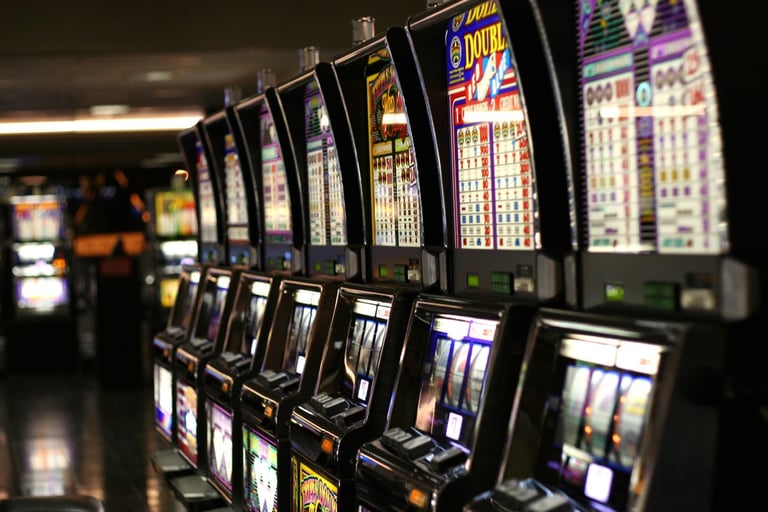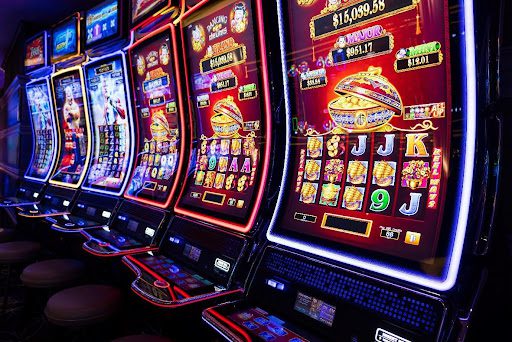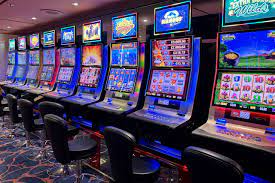Why Slot Machines Are Addictive: The Science Behind the Spin | Gambling Hood
Discover why slot machines are so addictive and how casinos design them to keep players hooked. Learn the psychology, science, and tricks behind the spin with Gambling Hood’s expert insights.
AWARENESSCASINO TIPSCASINO GAMES
9/10/20254 min read
Why Slot Machines Are Addictive: The Science Behind the Spin
Introduction
Slot machines are everywhere—whether in land-based casinos, online platforms, or even on mobile apps. They’re flashy, colorful, and incredibly easy to play. Unlike poker or blackjack, you don’t need any strategy or skill—just press a button or pull a lever and wait for the reels to stop.
But here’s the twist: slot machines are also the most addictive games in the casino. Millions of players around the world lose money daily, yet they keep spinning. Why? Because slot machines are designed not only as games of chance but also as psychological traps that exploit how our brains respond to risk, reward, and excitement.
In this blog, we’ll uncover the science behind slot machine addiction, breaking down the psychological, neurological, and design tricks casinos use to keep players hooked. We’ll also share insights from Gambling Hood, a platform dedicated to raising awareness about responsible gambling.
The Simplicity That Hooks Players
One major reason slots are addictive is their simplicity.
No rules to memorize.
No strategy required.
Just spin and hope.
This low barrier to entry attracts casual players. Even beginners who are intimidated by card games like blackjack or poker find slot machines comfortable. That comfort quickly turns into long hours of play, often without realizing how much money is being spent.
The Role of Randomness: Why We Chase Wins
Slot machines run on Random Number Generators (RNGs). This means every spin is independent and unpredictable. But our brains are wired to find patterns, even when none exist.
When players see certain symbols appear often, they believe a win is “due.”
The randomness creates a sense of suspense and hope on every spin.
Small wins or near-misses trick players into believing a big jackpot is around the corner.
This illusion of control keeps players engaged longer than they should.
The Near-Miss Effect
One of the strongest psychological hooks in slot machines is the near-miss effect. Imagine spinning and landing two jackpot symbols, with the third stopping just one position away. Your brain interprets this as being “so close to winning.”
In reality, the chance of hitting the jackpot is the same as before. But near-misses trigger dopamine in the brain—the same chemical associated with rewards. Studies show near-misses activate the brain almost as strongly as actual wins, making you want to spin again.
Variable Rewards: The Same System Social Media Uses
Psychologists call slot machines variable ratio reinforcement systems. This means:
Wins happen unpredictably.
Sometimes you win quickly, other times after many spins.
This uncertainty keeps you hooked because your brain loves unpredictability. It’s the same system that powers addictive apps like Instagram or TikTok, where you don’t know when the next dopamine hit will come. Casinos figured this out long before social media.
Losses Disguised as Wins
Another clever trick is LDWs (Losses Disguised as Wins). For example:
You bet $1.
The slot pays back $0.40.
The machine flashes lights and plays sounds, celebrating the “win.”
Even though you lost money, your brain interprets it as a positive outcome. Over time, this reinforces behavior and keeps you spinning.
The Sensory Overload
Casinos design slots to attack your senses:
Flashing Lights – Every spin feels exciting, even when losing.
Sound Effects – Wins and near-wins have celebratory sounds.
Color Psychology – Bright reds, golds, and greens make the game feel rewarding.
Immersive Themes – From Egyptian pyramids to superheroes, slots pull you into different fantasy worlds.
This multi-sensory environment tricks the brain into focusing on the experience, not the money lost.
Time Distortion: Why You Forget Hours Have Passed
Slot players often lose track of time. Why?
No clocks or windows in casinos.
Online slots fill the screen completely, blocking distractions.
Repetitive play creates a trance-like state called “the slot machine zone.”
Researchers found that many problem gamblers describe entering a “zone” where nothing else matters except the next spin.
Why the House Always Wins with Slots
Unlike blackjack or poker, slots have one of the highest house edges in casinos—usually between 5% and 15%. This means:
For every $100 wagered, the casino expects to keep $5–15 in the long run.
The longer you play, the closer your results will get to this mathematical reality.
No matter how many spins you make, the casino’s profit is guaranteed.
How Online Slots Make Addiction Worse
With the rise of digital gambling, online slots have taken addiction to the next level:
24/7 Access – You can play anytime, anywhere.
Instant Deposits – Just a click to add more money.
Mobile-Friendly – Always in your pocket, harder to resist.
Free Play Versions – Start with free spins, then move to real money once hooked.
According to Gambling Hood, online slots have the fastest-growing addiction rate because of their convenience and accessibility.
Common Mistakes Players Make with Slots
Believing in Hot Machines – Every spin is random; no machine is “due” for a win.
Chasing Losses – Increasing bets after losses usually leads to bigger losses.
Ignoring House Edge – Thinking luck will overcome mathematics.
Playing for Hours – Time distortion makes losses pile up unnoticed.
Falling for Promotions – OTPs and free spins often come with high wagering requirements.
How to Enjoy Slots Without Getting Hooked
Slot machines aren’t evil—they’re entertainment. But to avoid addiction, follow these tips:
Set a Budget – Decide how much you can afford to lose.
Use Time Limits – Don’t play for hours without breaks.
Treat Wins as Lucky, Not Skill – Don’t chase patterns.
Avoid Alcohol – Stay sharp while gambling.
Walk Away Ahead – If you win, cash out before the casino takes it back.
As Gambling Hood emphasizes: “The only way to truly win at slots is to play responsibly and know when to stop.”
The Future of Slot Machines
Technology continues to evolve, and so do slot machines:
Skill-Based Slots – Combining video game mechanics with chance.
Virtual Reality Slots – Fully immersive environments.
Crypto Slots – Accepting Bitcoin and Ethereum.
AI-Powered Customization – Machines adjusting difficulty to match your play style.
While innovation makes slots more fun, it also makes them more addictive—highlighting the need for responsible gambling education.
Conclusion
Slot machines are addictive not by accident, but by design. From near-misses and variable rewards to flashing lights and time distortion, every detail is built to keep players spinning. Add in the high house edge, and it’s no surprise that most players lose in the long run.
This doesn’t mean you should never play slots—it means you should play with awareness. Treat slot machines as entertainment, not a way to make money.
As highlighted by Gambling Hood, the smartest gamblers are those who enjoy the thrill of the spin while knowing their limits. If you control the game, the game won’t control you.






© 2026 All rights reserved.
Follow us
Quick Links


